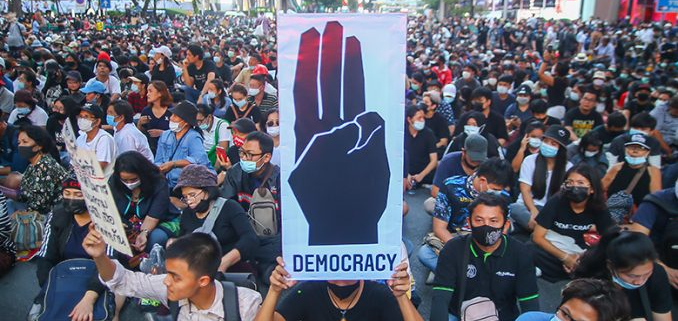ASEAN at a Crossroads: An Autocratic Turn in the Region
According to Democracy Report 2022, published by V-Dem Institute, Southeast Asian countries were reported to experience either democratic stagnation or regression, indicating a shift towards a more autocratic region.
Although most Southeast Asian countries hold elections, they are considered to be the feature of, rather than the cause of, democratization in Southeast Asian countries. These countries cannot simply be labeled as electoral democracies. Elections and electoral institutions are vulnerable to a certain degree of abuse and corruption. In that vein, Democracy Report 2022 did not qualify these Southeast Asian countries as electoral democracies, except Indonesia and Timor-Leste.
The political development in the Philippines under Duterte made the Philippines fall under the category of electoral autocracies following Cambodia, Malaysia, and Singapore. Despite elections being held in these countries, their electoral institutions failed to uphold democratic principles.
Meanwhile, Myanmar, Thailand, and Vietnam downgraded from electoral autocracies in 2011 to closed autocracies in 2021, following Laos. The citizens of these countries barely have institutional capacities to hold accountable power holders — individuals or groups of people. Military forces have become a critical player in advancing autocratic governance in the region. It is evident in the 2014 Thai coup d’état and the most recent Myanmar coup d’état in which democratic institutions and human rights were violated.
Beyond electoral components, an autocratic turn in the region has advanced through ‘authoritarian innovations’ in a broader regional geopolitical context and within individual countries. They are new governance practices, which take different forms, intended to shrink meaningful public political participation. The COVID-19 pandemic has also further intensified the use of authoritarian practices.
Such an autocratic turn poses a challenge to ASEAN to realize its vision of being a people-centered and people-oriented community. In this vein, unpacking how this trend further intensifies is critical to enable ASEAN as a regional bloc to curb further democratic regression. Two issues are worth discussing here.
First, in a broader geopolitical context, the rise of China has unavoidably shaped — complicated — the ways in which Southeast Asian countries and ASEAN navigate their internal political dynamics, enabling anti-democratic forces in the region to grow.
The 2021 Myanmar coup d’état was clear evidence. The Myanmar armed forces claimed that the coup was a ‘constitutional’ response to the election fraud committed by the National League for Democracy, which won a landslide victory in the 2020 election. The Institute for Strategy and Policy reported that over 5,600 civilians, including four democracy activists, were executed by the junta under the banner of the State Administration Council (SAC).
Responding to the political crisis in Myanmar, the nine ASEAN leaders and the Myanmar junta chief agreed upon the “Five-Point Consensus” as the framework to maintain peace and stability in the region. However, by exploiting the ASEAN’s ‘non-interference’ principle, the SAC refused to conform to the consensus, resulting in no tangible outcomes.
It is clear that China maintains its legitimacy as a strategic and economic partner for ASEAN countries through its Belt and Road Initiatives while leveraging the democratic decline in the region to pursue its national interests. Positioning itself as the dominant power in the region, the rise of China’s power has indirectly empowered anti-democratic forces in the region by providing support for their political survival.
China’s support for the Myanmar junta to protect its political sovereignty has complicated ASEAN’s approach to the crisis. Keeping this in mind, the non-interference principle must be revisited to avoid its abuse by the member states in the name of sovereignty at the expense of human rights and to enable Responsibility to Protect.
Second, the emerging new authoritarian practices to subvert democratic progress are evident in and intensified by handling the COVID-19 pandemic in Southeast Asian countries. The handling has been shadowed by shrinking civic space.
Contact tracing essentially designed to halt the spread of COVID-19 may serve as a platform for governments’ digital surveillance unrelated to the pandemic. Digital Reach, an organization that looks into the impact of technology on human rights in Southeast Asia, monitored the use of digital contact tracing across six ASEAN countries, Indonesia, Malaysia, Singapore, Thailand, the Philippines, and Vietnam.
One big concern arising from this digital contact tracing is a privacy issue. In Singapore, despite having a personal data protection policy, data collected from its contact tracing app was made accessible for criminal investigations. The report from Digital Reach showed that it is used to silence critics of the government of Singapore. In this context, the absence of a personal data protection policy in Indonesia, Thailand, and Vietnam increases the likelihood of public surveillance and violation of the right to privacy.
Responding to the pandemic, ASEAN released the ASEAN Comprehensive Recovery Framework outlining ASEAN’s five broad strategies for recovery. Yet, this recovery framework disregards the importance of upholding democratic principles, although strengthening human security is part of its broad recovery strategies.
Given the long-term impacts of the pandemic, democracy in the region will continue to deteriorate if ASEAN fails to center democratic principles in its COVID-19 recovery strategies. ASEAN must work closely with its accredited entities, including civil society organizations, to hold ASEAN governments accountable in their efforts for COVID-19 recovery.
Two issues above demonstrate that ASEAN is, once again, at a crossroads. Democracy in the region is beyond fragile; it will continue to decline if ASEAN turns a blind eye to it. However, to renew ASEAN’s commitment to democratic principles in the region, it must begin from within each of ASEAN member states.
*The views expressed in this article do not represent any of the organizations with which the authors are affiliated.
About writers:
- Muhammad Ammar Hidayahtulloh is a PhD candidate at the School of Political Science and International Studies, The University of Queensland. Twitter: @muhammadammarh_
- Muhammad Maulana Iberahim is Regional Media & Communications Support Officer at International Organization for Migration. Twitter: @iberahims




Leave a Reply
Want to join the discussion?Feel free to contribute!